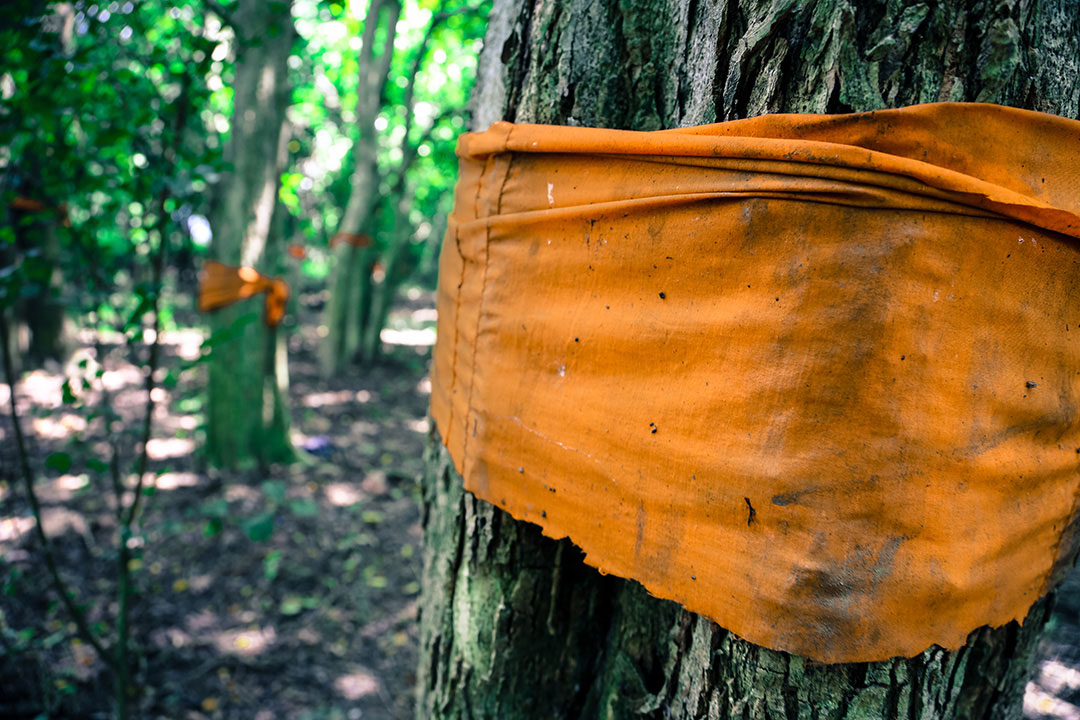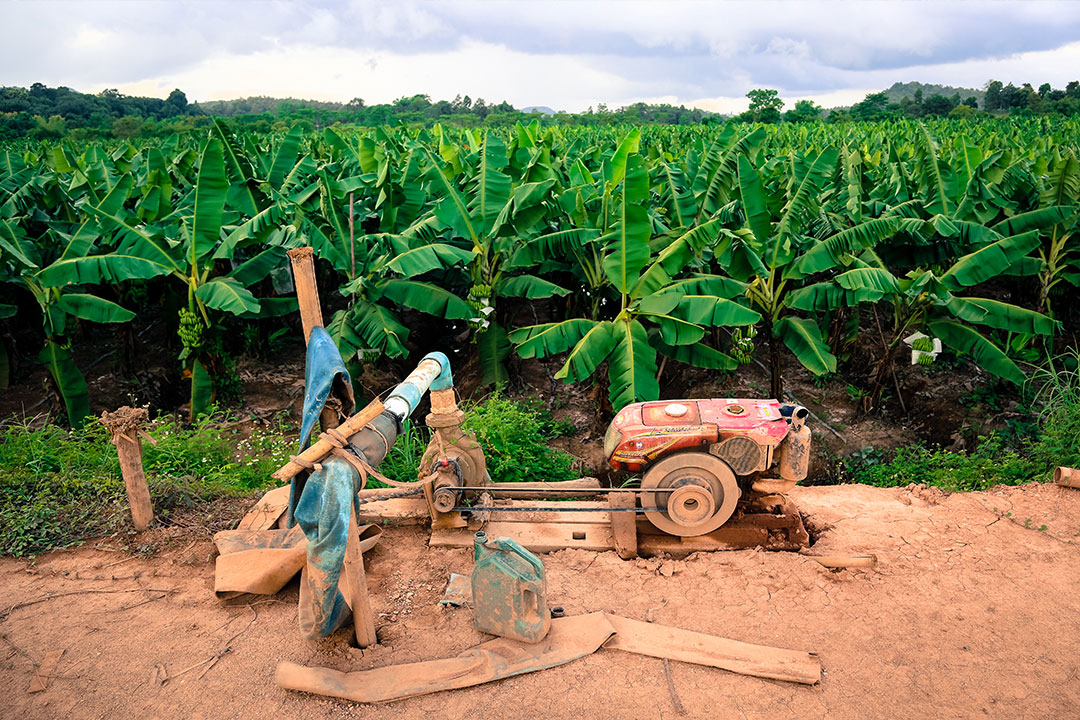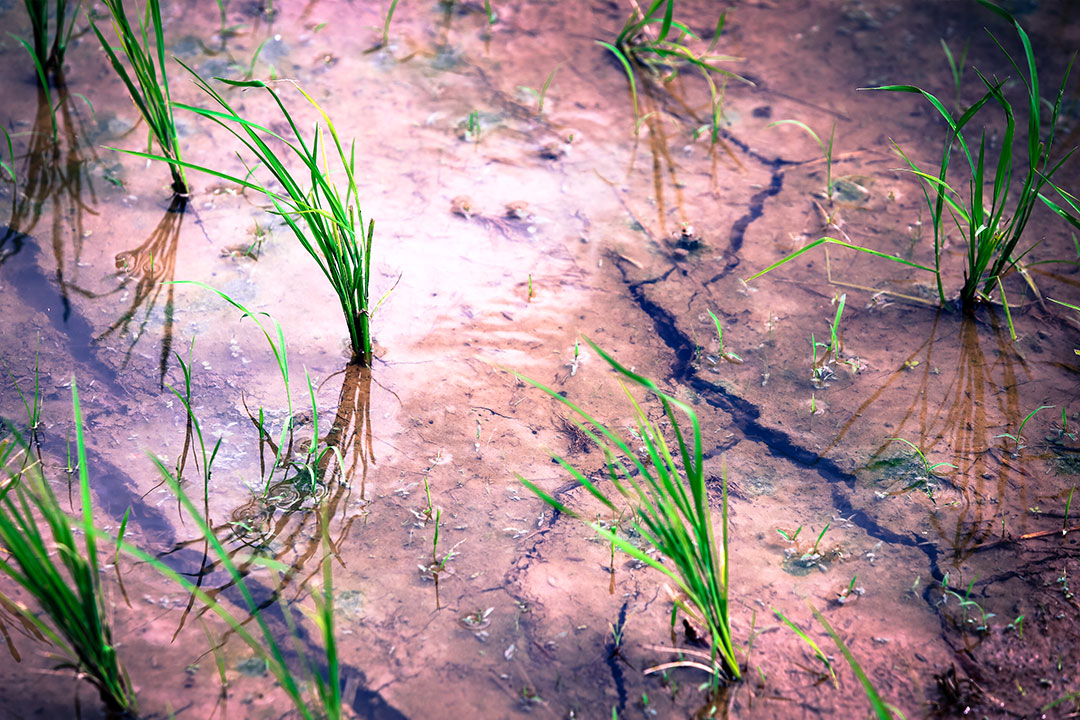Teacher Confronts Chinese Dams
Upstream Mekong dams and Chinese-backed banana plantations anger villagers led by a respected teacher.
Location: Thailand
The rain hasn’t stopped since yesterday. But these seem to be the last downpours of the season.
I’ve come to Chiang Khong, a quiet Thai town which takes its name from the Mekong River, to meet Niwat Roykaew, known widely as Kru Tee, or Teacher Tee. I first met him more than seven years ago. Since then, he’s established the Mekong School, which is promoting local knowledge and social justice along the Mekong. The school’s philosophy is based on outdoor learning and village empowerment through research and participatory action.
With no invitation, I’m going to turn up at his School for Local Knowledge and see if I can talk to him about the Mekong.
I catch a motorbike through the old town, past the port, and down a narrow lane along the riverbank to where a rambling brown wooden building sits in a profusion of trees.
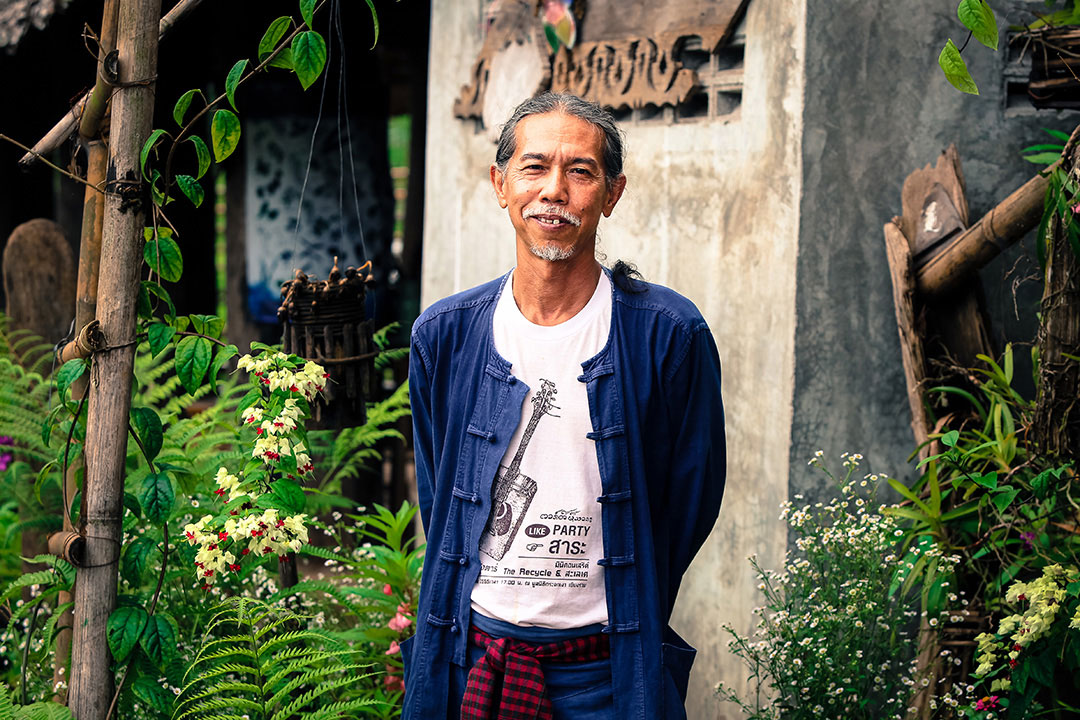
When I meet Kru Tee after a long absence, I notice that his long hair has grown almost completely grey. He’s just returned from Chiang Saen, where he’s working to unify two communities to stand against Chinese-sponsored organizations trying to exploit the Mekong.
In an earlier life Kru Tee was a headmaster in remote indigenous schools, teaching during a tragic period of land grabbing. This impressed on him a profound respect for the bonds between nature and culture. As he says, "Life changed me. The forest changed me. Time changed me."
When Kru Tee returned to Chiang Khong, he found that Chinese power and money had changed the Mekong.
Kru Tee tells me the river normally starts rising in March, turning brown with titanic volumes of silt whipped into its flood. Fishermen think the fish smell the rain, taste the mud, and start migrating to their ancestral breeding grounds. These are not random journeys. Hundreds of species of fish weave their way to precise places. Then between October and December the river level starts to drop.
Chinese dams disrupt Thai fishermen’s catch
But now this natural flow regime has been disrupted by China’s dams. The consequences reverberate through every community. Unseasonal water levels defeat fishermen’s strategies. They find the fishing rods and bamboo fish traps that they placed overnight high and dry in the morning, or worse yet washed away. Fishermen sometimes return to find they caught birds but not fish on their hooks.
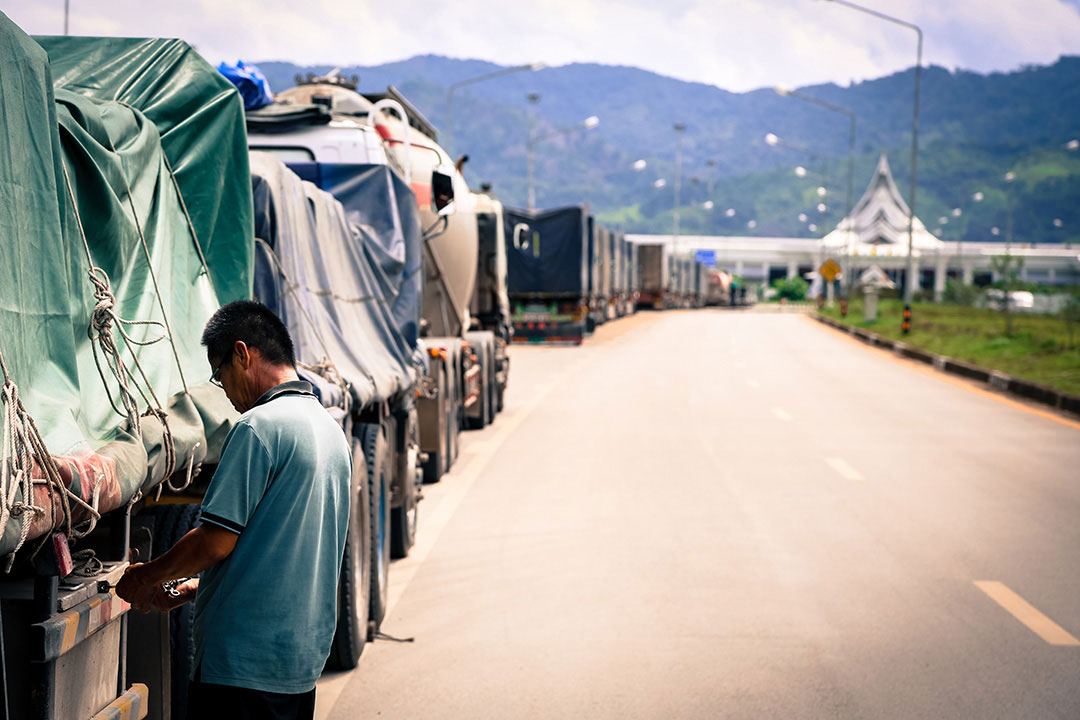
Kru Tee saw the river here dry up when the first mega-dam, Manwan, was filling its reservoir. Then when the Jinghong Dam was finished, a massive unseasonal flood washed downstream, a 13-meter surge scouring away riverbank homes and gardens. And again, six years ago, the Mekong River ran dry. Officials blamed climate change, so he went to see the Salween in Myanmar. It was full. Both rivers originate in China. The only difference between them was the dams.
Seven years ago Kru Tee said, "We have to assemble people from all of the downstream countries to demand that the Chinese be held accountable."
Kru Tee is now a plaintiff in a group of 37 local people who have initiated an action against the Xayaburi Dam, located in Laos on the mainstream of the Mekong. They’re preparing a case for the highest court in Thailand, the Supreme Court, to argue for downstream damages. If the case gets to the court it will set a precedent for transboundary rivers around the world.
"The fish can’t stay. This is becoming something other than the Mekong River."
- Kru Tee
Kru Tee’s long thin fingers comb through his hair as he looks away. "The fish can’t stay. This is becoming something other than the Mekong River," Kru Tee says. "If the Mekong has so many dams, then maybe its name is no longer Mekong. Maybe we need a new name, the ‘Me Nam Can Kwam Tay,’ or the death of a river."
Kru Tee’s work raises critical questions about the nature of development. Chiang Khong is a site where local people are arguing with regional powers over the basic values of the river.
Ten years ago, ASEAN (Association of Southeast Asian Nations) designated this region as a crossroads between north-south and east-west trade links from China to Vietnam and from the Indian to the Pacific Oceans.
To achieve this, China is funding the Mekong Navigation Project, which will blast away most of the rapids on the Mekong to make way for large ships and freighters that will travel down the river. By 2004, Stage 1 of the project had already destroyed 90 percent of the rapids from China to the Golden Triangle. And in 2015, nearby Myanmar signed an agreement for Stage 2 that puts Chiang Khong and its surrounding rapids on the chopping block.
Kru Tee says that these areas are important ecologically for humans, fish, birds, and plants. The blasting will kill the ecosystem.
The rainfall thickens, rising to a dull rumble on the wooden structure of the school, and Kru Tee gets more animated, his small thin frame as tense as a spring.
Local resistance

The locals here won’t go quietly. Twice in the past 10 years Chinese
surveys have been stopped when Chiang Khong community groups boarded
the survey boats. Kru Tee says he simply tells the crews, "I am a
local person. When you do blasting, we’ll have problems. Next time
you come here, I’ll take your boat."
A local fisherman, Som Vang, agrees. A barrel-chested man, he laughs and says, "It’ll be dangerous for those who try to blow up the rapids. They’ll have a problem with me." I believe him.
"It would be like war, like blowing up someone’s farm."
"No," he says, shaking his head. "They should use the road for trade instead of the river."
Som Vang’s father fished, and so did his grandfather before him. The Mekong is his world, and his life. Since China built the dams, it’s gotten hard to catch fish, and the small fish and many others have disappeared.
Kru Tee isn’t a violent man. But he’s part of a local group of fishermen, farmers, and young people. They have a boat ready to launch. "I’m ready," he says, "I have no worries about my life." His face lights up with the finality of this pledge.
"You develop from local resources, not from destroying them."
- Kru Tee
A 200-ton boat thrums by, heading slowly upstream toward Chiang Saen, or maybe even China. Kru Tee points at it, explaining that the boat comes from the city of Luang Prabang. "People in the city, they don’t know." he says."The locals know. You develop from local resources, not from destroying them. And innovation will evolve from within the community."
"People ask me, ‘Kru Tee, these dams. Can you stop them?’ I say,‘I don’t know, but I can start to do it.’ Maybe in 100 years the people of Asia will know more about nature and destroy the dams. I will fight for this all my life. I don’t care. I believe the dams will be gone. I believe." He points to the river, "I wish that I could live 500 years, just to see that."
Banana plantations pollute the river
The next day before the sun has risen, I meet a local Thai journalist named Aoi, who has written extensively on the impact of special economic zones (SEZs), and in particular on banana plantations backed by Chinese money.
We go to a local community forest at the juncture of a Mekong tributary river that has been designated as one such economic zone. But community reaction has stopped the project for now.
"Kru Tee stopped it," says Aoi, making a chopping motion with her free hand.
Walking through the quiet shadows I take pictures of dozens of trees wrapped in the orange robes of Buddhist monks. The villagers have sanctified the trees to protect them. These wetlands should flood in the rainy season when the Mekong overflows. Fish breed here, but the last flood was eight years ago. That was before the Mekong’s flows felt the full impact of the upstream dams.
A man and a woman working in the hottest sun of the day are replanting rice seedlings. They tell us that a banana plantation has been established upstream on the river. By January, when they would normally plant their second season of rice, the plantation had taken the water away.
Aoi assumes that the plantation is managed by shell companies but will bring in Chinese investors. We drive until we encounter endless fields of banana palms and find a dozen young workers in a production line packing large green bananas into boxes for export to China. The manager reassures us that they don’t use any chemicals, and he says that the business is a source of employment.
Aoi drives me to a village called Ban Nam Ing, which she first visited earlier this year when the river dried up. For a month, water was trucked in from reservoirs to keep households running, but gardens dried up and died. This was found to have been due to the banana plantation operators draining the river to water their crop. A young mother, Tuk Ta, explains that since the banana plantation opened, her son has developed a rash that looks like herpes. No one had ever seen this kind of rash before.
Tuk Ta contacted a friend who’s a nurse. The nurse tested the water in the river and found unsafe levels of chemicals in it. Meanwhile the fish in the river have disappeared.
The poorest families use charcoal to try and make the water safe. The rest are trying to raise money for a filtration system for the whole town.
Tuk Ta says, "I worry that in the future we can’t eat, drink, wash, catch fish, or swim." She brings us more bottled water and laughs at the irony. "The rich man sells us our water now," she says.
Tuk Ta says she thinks there is nothing that they can do to stop the actions of the international interests that have brought this unwelcome change to their lives. They roll over their heads like the clouds, she says.
Leaving us, Aoi explains that whatever the issues here in Thailand may be, it is worse in neighboring Laos where there are no governmental checks and balances, and the banana plantations are far larger. Unregulated quantities of pesticide, plastic, preservatives, and fertilizer are leeching into the river and flowing from Laos downstream.
The next day is my last in Thailand, and I visit an 84-year-old fisherman named Leung Sao who knows every rock in the Khon Pi Long rapids.
His daughter shows us long spidery nets, all of them handwoven and looking like shiny blue hair. Each took a month to make. It was a good life, a good living.
"If the Chinese want it, there’s nothing I can do."
- Local Fisherman
"My father was a good fisherman," she says. "In a single day he could earn a lot of money."
His other child, a son named Sange, arrives. Leung Sao says that he has passed on everything to his son, all of his knowledge about the rapids, water flow, hidden rocks, all the names, and how to navigate the river.
His son stopped fishing this year when the impact of the dams made it too hard to find fish. Now he’ll be a freelance driver or grow vegetables instead.
Leung says he is sad to know that fish stocks have been reduced so much. Some are gone forever. And now young people can’t make the nets or the gear. The skills are being lost. As the fish disappear, so does the culture of the people. "I cannot stop it," he says. "If the Chinese want it, there’s nothing I can do."
